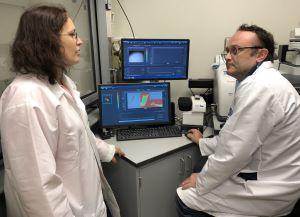Dr. Mioara Larion leads the Cancer Metabolism Research Program and devises innovative approaches to improve outcomes for central nervous system tumors.
By Neuro-Oncology Branch Staff
March 25, 2021
How can we be innovative in our approach to improve outcomes for central nervous system (CNS) tumors? That is the driving question behind the Cancer Metabolism Research Program at the NCI Center for Cancer Research's Neuro-Oncology Branch (NOB), led by Investigator Mioara Larion, Ph.D.
Dr. Larion is a trained biochemist who received a Ph.D. in enzymology from Florida State University. She also holds a Master of Science in spectroscopy and a Bachelor of Science in biochemistry. During her training, she learned about the complexities of enzymes: how they work, their activity, and how certain mutations cause disease. Eventually, she began integrating biochemistry to study interesting mutations in enzymes—such as the isocitrate dehydrogenase (IDH) enzyme—that cause disease.
Around that time, the IDH mutation was discovered in brain tumors. “I started investigating and reading about IDH, and wanted to understand the enzyme dynamics, biochemistry, and the interaction between function and structure of enzymes,” Dr. Larion says.
During her postdoctoral training at Ohio State University, she became interested in metabolism and metabolomics. “That is when I started trying to understand the role of the IDH mutation in metabolism,” Dr. Larion says. This interest led her to neuro-oncology, because gliomas commonly have an IDH mutation.
Metabolism and Effect on CNS Tumors
Metabolism is a term used to describe the complex chemical changes that take place in a cell. Metabolomics is the study of substances called metabolites in cells and tissues. Metabolites are small molecules that are made when the body breaks down food, drugs, chemicals, or its own tissue. They can be measured in blood, urine, and other body fluids. Disease and environmental factors, such as diet, drugs, and chemicals, can affect how metabolites are made and used in the body. Metabolomics may help researchers find new ways to diagnose and treat diseases, including cancer.
Tumor metabolism involves all of the metabolic pathways that are changed due to cancer—including inside the tumor and its surrounding area known as the microenvironment, as well as the alterations in metabolism that occur in the body from the tumor. These changes affect the availability of nutrients that tumor cells can uptake and use. Tumors can use nutrients surrounding the tumor, and they can restructure metabolic pathways in order to utilize these nutrients. Genetic changes allow tumors to thrive in these conditions. These are all key factors that metabolism researchers aim to understand.
The IDH mutation is an example of a mutation in a metabolic gene and has a large effect on the prognosis, classification, and treatment of gliomas.
The Cancer Metabolism Research Program
Today, Dr. Larion leads the NOB's Cancer Metabolism Research Program. She is interested in the metabolic needs of cancer cells and how they process nutrients, in hopes of delaying tumor growth. Her laboratory focuses on studying IDH-mutant gliomas, because IDH mutations can cause metabolic changes. Since 2015, she has worked diligently to establish a robust research program to advance the field of cancer metabolism and has expanded her program to include lipid-based research of gliomas.
Dr. Larion’s team recently discovered that lipid pathways are important for IDH1-mutant glioma growth. The researchers also found that targeting specific enzymes from either fatty acid synthesis or sphingolipid pathways leads to cellular death in these specific cells.
Dr. Larion is motivated to help brain and spine tumor patients in the clinic. “My group wants to see if what we find in the lab can be translated into new clinic trials or treatments," she says. "We want to find something that can delay the growth of gliomas—and also help image the disease and monitor the response to treatments with biomarkers."
CNS Tumor Metabolism Conference
In an effort to advance the field of CNS tumor metabolism, Dr. Larion and NOB Chief Mark Gilbert, M.D., co-are leading a virtual symposium with the Society for Neuro-Oncology (SNO) on April 6-7, 2021, called Targeting CNS Tumor Metabolism. This will be the first conference that is entirely dedicated to education and research on brain tumor metabolism. Registration is free.
The goal of the conference is to “foster collaboration in the area of metabolism, which will positively influence outcomes for patients with CNS cancers,” SNO states. The conference will bring together clinicians, researchers, trainees, patients, and experts in the field of metabolism. Attendees will walk away with an increased understanding of the benefits of harnessing metabolism in clinical care.
“Dr. Gilbert and I recognized the need to bring the neuro-oncology community and the metabolism community together, in order to foster future collaborations and advance metabolic-based investigation and imaging applications in clinical settings,” Dr. Larion says.
It's important for researchers and clinicians to understand the metabolic consequences of mutations—and how we can use metabolism to delay tumor growth, improve tumor imaging, and provide information about treatment response or resistance.
Throughout the two-day symposium, participants will gain new insights into CNS tumor metabolism using state-of-the-art techniques. There will also be dedicated discussion about the interactions between metabolism and epigenomics or transcriptomics. Speakers from across the country will address the current standard of care for patients, as well as the challenges that providers and researchers face in targeting the metabolic signaling pathways. Top experts will share a variety of techniques, including how to prepare samples, sequencing best practices, imaging methodologies, and how to analyze data via mass spectrometry.
“The virtual symposium will foster collaboration so we can advance progress in metabolic targets, discuss challenges in the field, learn from each other, and accelerate progress in patient care,” Dr. Larion says.
